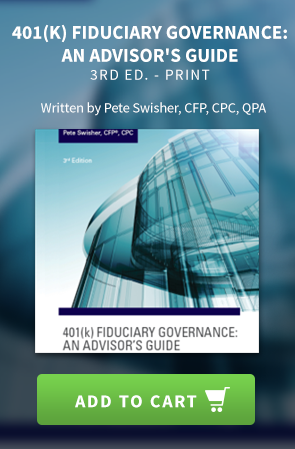Fiduciary Rules and Practices
The parties in one of the first university 403(b) plan excessive fee suits[1] filed in 2016 have come to terms.
This time the settlement (Henderson v. Emory Univ., N.D. Ga., No. 1:16-cv-02920, motion for preliminary settlement approval 5/29/20) involves the Emory University Retirement Plan and...
READ MORE
Concluding that “courts sometimes make standing law more complicated than it needs to be,” in a 5-4 decision, the nation’s highest court has ruled that plaintiffs in a suit involving a defined benefit plan hadn’t incurred the loss of benefits necessary to establish the right to bring suit.
More...
READ MORE
In MarketBeat, John Iekel discusses a recent blog entry that argues that cyber breaches of retirement plans put more than participants at risk—they also put plan sponsors at risk of fiduciary liability.
READ MORE
Technically, it is the plan sponsor (or employer) who has the responsibility for the actual day-to-day administrative functions of the 403(b) plan, or for choosing the plan administrator, called a TPA (third party administrator).
Even with a TPA, the employer will always be the one that can be...
READ MORE
A university that had won a dismissal of claims in an excessive fee suit will now have to confront some of those charges.
Noting that, “at this point, the complaint only needed to give the district court enough to infer from what is alleged that the process was flawed,” the Eighth Circuit Court...
READ MORE
The Department of Labor’s 2012 final rule to improve transparency of fees and expenses provides plan administrators protection from liability for the completeness and accuracy of information provided to participants as long as the plan administrator reasonably and in good faith relies upon...
READ MORE
Not all plan sponsors that offer a 403(b) plan must file a Form 5500; namely, those that are not covered by ERISA. But 403(b) plans that are covered by ERISA must file. And they need to be aware that errors are always possible when one files a Form 5500.
Among the many mistakes that are...
READ MORE
The Labor Department wants you (and your clients) to stop including Personal Identifiable Information (PII) on Form 5500 filings.
Scott C. Albert, QPA, Chief of the DOL’s Division of Reporting Compliance, explains that the agency makes the information in Forms 5500/5500-SF available to the public...
READ MORE
The Department of Labor’s 2012 final rule to improve transparency of fees and expenses includes a requirement that information be provided to participants that allows them to compare investment options.
The Comparative Format Requirement provides that investment-related information must be...
READ MORE
ERISA does not require fiduciary liability insurance, as it does fidelity bonds. Nonetheless, it is important to pay careful attention to fiduciary liability coverage.
Ordinarily, those covered by fiduciary liability insurance are:
the plan;
the plan sponsor;
executives;
board members...
READ MORE
Communicating with retirement plan participants is always important; and aside from law and regulation requiring it, such communications can serve participants well and help make a retirement plan more effective and meaningful. But doing so during a pandemic poses challenges and can require...
READ MORE
Another excessive fee suit has been filed against a billion dollar university 403(b) plan, though it treads familiar ground(s).
The latest (Santiago v. Univ. of Miami, S.D. Fla., No. 1:20-cv-21784, complaint filed 4/29/20) was brought by plaintiffs Augustino Santiago, Lilly Leyva, Guillermo...
READ MORE
Tech Talk addresses what happens after an audit of a retirement plan is conducted, and the questions one may ask of an auditor.
READ MORE
In MarketBeat, Maria Hurd writes about the required minimum distribution rules under the SECURE Act and how they affect financial statement audits.
READ MORE
Under the Department of Labor’s 2012 final rule to improve transparency of fees and expenses to plan participants, investment-related information also must be provided. This category contains several subcategories of core information about each investment option under the plan, including the...
READ MORE
Recent guidance clarifies that retirement contributions for unincorporated sole proprietors are excluded from payroll costs in calculating the maximum loan amount under the Paycheck Protection Program (PPP)—and so can’t be forgiven under the terms of that program.
Specifically, the Small Business...
READ MORE
Under the Department of Labor’s 2012 final rule to improve transparency of fees and expenses to plan participants, if there is a change to a designated investment alternative's fee and expense information after the plan administrator has furnished the annual disclosure to participants and...
READ MORE
Citing the impact of the Coronavirus pandemic, the Garden State has extended the deadline for considering its proposed fiduciary rule.
New Jersey’s proposed new uniform fiduciary standard was issued April 15, 2019, but under the state’s statutory deadline, the proposal would have expired if...
READ MORE
The parties in one of the first university 403(b) plan excessive fee suits brought by the St. Louis-based law firm of Schlichter, Bogard & Denton have come to terms.
This time it’s a suit brought against the Emory University Retirement Plan and the Emory Healthcare, Inc. Retirement Savings...
READ MORE
Approximately 20 of these suits have been filed since 2016—this would be the seventh settlement.
This time the defendants is Princeton University, and the original suit was filed nearly three years ago by plaintiff Elysee Nicolas individually and as representative of a class of participants and...
READ MORE


